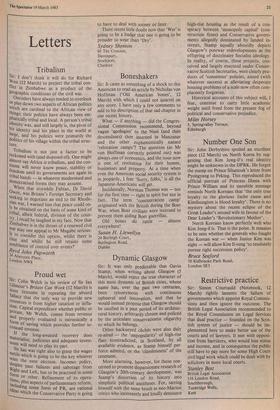Dynamic Glasgow
Sir: It was only predictable that Gavin Stamp, when writing about Glasgow (5 March), would reject the true character of this most dynamic of British cities, whose name has, over the past two centuries, been synonymous with continuous upheaval and innovation, and that he would instead propose that Glasgow should be ossified in a past period of its architec- tural history, arbitrarily chosen and policed by the articulate conservationist oligarchy to which he belongs.
Other hackneyed cliches were also duly re-aired — the 'unpopularity' of high-rise flats (contradicted, in Scotland, by all available evidence, as Stamp himself per- force admits), or the 'classlessness' of the tenement.
More alarming, however, for those con- cerned to promote dispassionate research of Glasgow's 20th-century development, was Stamp's distortion of its history into simplistic political antitheses. For, tarring himself with the same brush as neo-Marxist critics who incessantly and loudly denounce
high-rise housing as the result of a con- spiracy between 'monopoly capital' (con- struction firms) and Conservative govern- ments allegedly dominated by landed in- terests, Stamp equally absurdly depicts Glasgow's postwar redevelopments as the offspring of doctrinaire Socialist ideology. In reality, of course, these projects, con- ceived and largely executed under Conser- vative Scottish Secretaries, were clearly pro- ducts of `consensus' policies, aimed (with whatever success) at alleviating desperate housing problems of a scale now often com- placently forgotten.
Historical accounts of this subject will, I fear, continue to carry little academic weight until freed from the present fog of political and conservative prejudice. Miles Horsey
5, Springvalley Terrace, Edinburgh










































 Previous page
Previous page